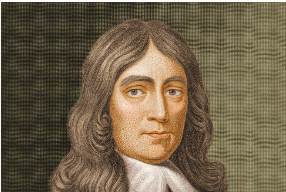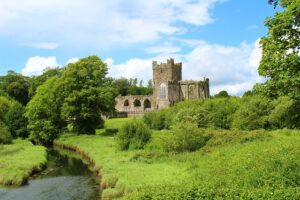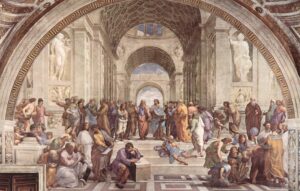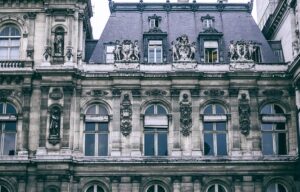JOHN MILTON
John Milton was born in Bread Street cheap-side. His father was a Scrivener, and composer of music. He educated at St. Pauls School and Christs College and graduated in 1629, got his M.A.’s degree in 1632.
In college he wrote poems, which have all the passions of his youth. After leaving Cambirdge, he took no profession, but lived at Horton with his father reading the classical literature, and preparing himself for his vocation, as a poet. After this life self-retire- ment, he went abroad on his journey of the Continent; chiefly Italy. The over-throw of monarchy, and rise of Cromwell, hastend his return to England. He was a great upholder of Cromwell, and execution of Charles 1 brought him glory as the Latin Secretary of Cromwell.

While still abroad, he married Mary Powels, from an aristocratic family. After a short period, quarrelled with her, and then made peace, however she died after some time. In his life he married, thrice and is third wife survived him.
After Restoration, he was arrested and fined but released, for he was now regarded as a poor helpless blind man. Though he got freedom, but he lost the major part of his fortune. He died in 1674 and was buried beside his father.
His Works
John Milton tried seriously, to combine the Renaissance and the Reformation, and the rich stores of classical learning with the revival of deep religious feelings. He spent a studious quiet at Horton. It was here that John Milton composed his L’Allegero, LL Penseroso, Arcadis, Cosmus and Lycidas. During the twenty years that elapsed between this period and that of his Paradise Lost, he wrote no poems but sonnets.
However during this period, he turned towards prose than poetry. A great number of pamphlets sponsoring various topics, were published. In them he championed, a great diversity of thoughts and matters against episcopacy—government of a Church by bishops—and marriage etc.
The Restoration in 1660, forced him back into private life. He had gone blind, in the service of the commonwealth A gesture of the heroic, marks his closing years, when blind, half fugitive, old, hope- shattered, he turned to compose the great poetic works, which from his youth had haunted his imagination. The works are Paradise Lost, Paradise Regained, and Samson Agonistes. They are the greatest of English non-dramatic poems. John Milton wrote in a manner, that recalled poetry to the most elevated and regal conception, of its function, In the national upheaval; he was a Contro- versialist and Latin Secretary.
It is said about him that he combined in him a marvellous union of intellectual and creative powers, both at their highest, He was the first to use blank verse. He gave to this medium, a grandeur, force and music. Thus his work has a true reflection of his own faith, and high morality. John Milton is regarded beside Shakespeare, as one of the most learned of English Poets, and one of the greatest personalities in English literature.
Read More
Wordsworth and His Treatment Of Nature
Wordsworth and His Love for Nature
Introduction to Fiction and Non Fiction
Of Death — Francis Bacon (Text)
Of Truth Critical Analysis by Sir Francis Bacon
Of Truth by Francis Bacon Summary
Visit Us on our Facebook Page:






